一般疑问句肯定及否定回答1
一般疑问句的回答
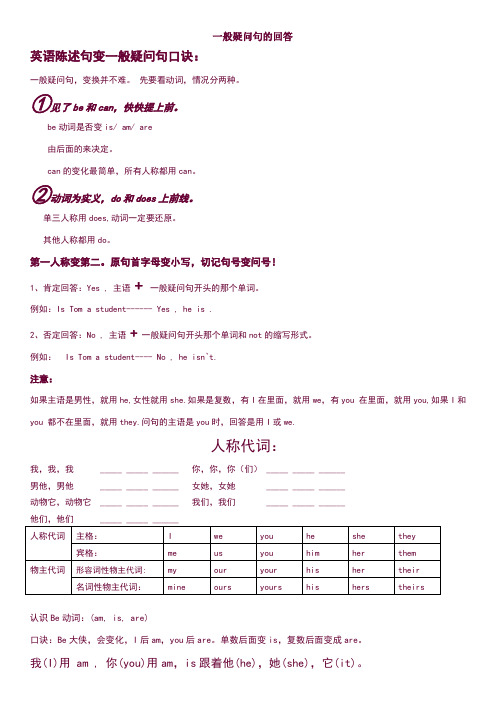
一般疑问句的回答英语陈述句变一般疑问句口诀:一般疑问句,变换并不难。
先要看动词,情况分两种。
①见了be和can,快快提上前。
be动词是否变is/ am/ are由后面的来决定。
can的变化最简单,所有人称都用can。
②动词为实义,do和does上前线。
单三人称用does,动词一定要还原。
其他人称都用do。
第一人称变第二。
原句首字母变小写,切记句号变问号!1、肯定回答:Yes , 主语+ 一般疑问句开头的那个单词。
例如:Is Tom a student------ Yes , he is .2、否定回答:No , 主语+一般疑问句开头那个单词和not的缩写形式。
例如: Is Tom a student---- No , he isn`t.注意:如果主语是男性,就用he,女性就用she.如果是复数,有I在里面,就用we,有you 在里面,就用you,如果I和you 都不在里面,就用they.问句的主语是you时,回答是用I或we.人称代词:我,我,我 _____ _____ ______ 你,你,你(们) _____ _____ ______男他,男他 _____ _____ ______ 女她,女她 _____ _____ ______动物它,动物它 _____ _____ ______ 我们,我们 _____ _____ ______他们,他们 _____ _____ ______认识Be动词:(am, is, are)口诀:Be大侠,会变化,I后am,you后are。
单数后面变is,复数后面变成are。
我(I)用 am , 你(you)用am,is跟着他(he),她(she),它(it)。
单数名词用is,复数名词全用are。
变否定,更容易,be后not加上去。
变疑问,往前提,句末问号莫丢弃。
还有一条须注意,句首大写莫忘记。
A将下列各句改为否定句一般疑问句作肯定和否定回答
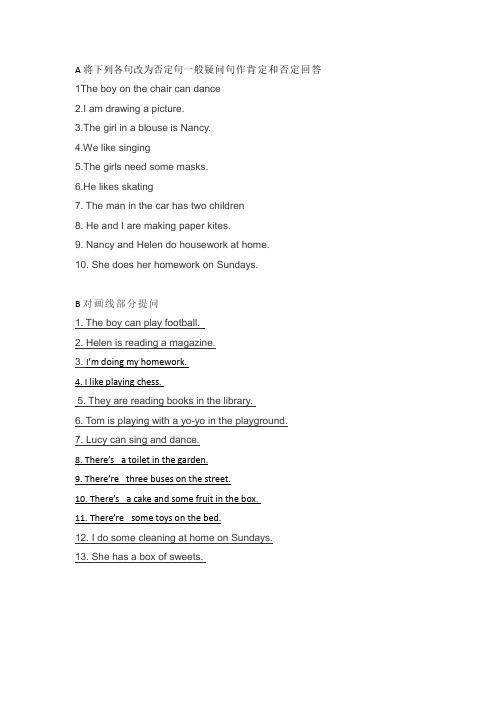
A将下列各句改为否定句一般疑问句作肯定和否定回答1The boy on the chair can dance2.I am drawing a picture.3.The girl in a blouse is Nancy.4.We like singing5.The girls need some masks.6.He likes skating7. The man in the car has two children8. He and I are making paper kites.9. Nancy and Helen do housework at home.10. She does her homework on Sundays.B对画线部分提问1. The boy can play football.2. Helen is reading a magazine.3. I’m doing my homework.4. I like playing chess.5. They are reading books in the library.6. Tom is playing with a yo-yo in the playground.7. Lucy can sing and dance.8. There’s a toilet in the garden.9. There’re three buses on the street.10. There’s a cake and some fruit in the box.11. There’r e some toys on the bed.12. I do some cleaning at home on Sundays.13. She has a box of sweets.I.陈述句(肯定句,否定句)1.肯定句:1) 主语+be动词+….*I am a teacher.He is a doctor.They are students.2) 主语+do动词的不同形式+….I play computer games everyday.He plays computer games everyday.We played computer games yesterday.2.否定句:1) 主语+be动词+not+….I am not a teacher.He is not a doctor.They’re not students.2) 主语+助动词+not+do动词原形+….*I don’t play computer games everyday.He doesn’t play computer games everydayWe didn’t play computer games everyday3.Exercises:肯定句变否定句:1)I am in Class Four, Grade Five. _______________________________2) He is funny. _______________________________3) They are friends. _____________________________________4) I have a pen. _________________________5) He has a pencil. ________________________________6) They ate breakfast yesterday. _________________________________ II.疑问句(一般疑问句,特殊疑问句)1.一般疑问句:1)问:be动词+主语+…? (与前面讲过的肯定句句式比较一下) 答:Yes, 主语+be动词。
否定的一般疑问句的回答
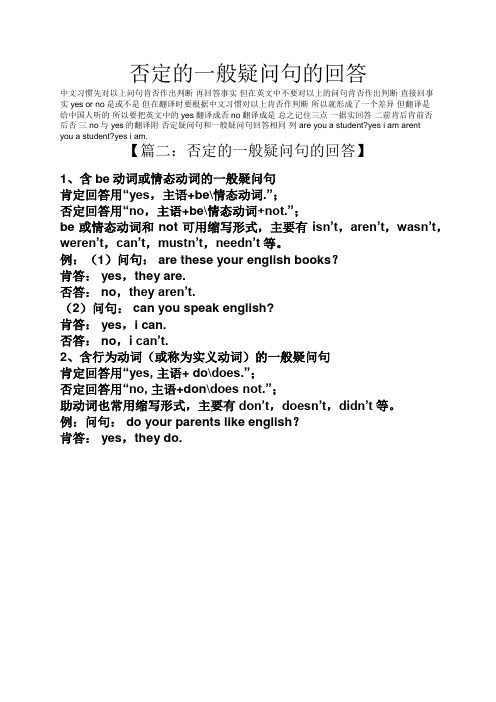
否定的一般疑问句的回答
中文习惯先对以上问句肯否作出判断再回答事实但在英文中不要对以上的问句肯否作出判断直接回事
实yes or no是或不是但在翻译时要根据中文习惯对以上肯否作判断所以就形成了一个差异但翻译是
给中国人听的所以要把英文中的yes翻译成否no翻译成是总之记住三点一据实回答二前肯后肯前否
后否三no与yes的翻译附否定疑问句和一般疑问句回答相同列are you a student?yes i am arent
you a student?yes i am.
【篇二:否定的一般疑问句的回答】
1、含be动词或情态动词的一般疑问句
肯定回答用“yes,主语+be\情态动词.”;
否定回答用“no,主语+be\情态动词+not.”;
be或情态动词和not可用缩写形式,主要有isn’t,aren’t,wasn’t,weren’t,can’t,mustn’t,needn’t等。
例:(1)问句: are these your english books?
肯答: yes,they are.
否答: no,they aren’t.
(2)问句: can you speak english?
肯答: yes,i can.
否答: no,i can’t.
2、含行为动词(或称为实义动词)的一般疑问句
肯定回答用“yes, 主语+ do\does.”;
否定回答用“no, 主语+don\does not.”;
助动词也常用缩写形式,主要有don’t,doesn’t,didn’t等。
例:问句: do your parents like english?
肯答: yes,they do.。
would一般疑问句用法及回答

would一般疑问句用法及回答摘要:一、would 的一般疑问句用法1.构成:Would + 动词原形+ 其他成分2.疑问词:Would + 主语+ 动词原形+ 其他成分3.回答:肯定回答:Yes, 主语would.否定回答:No, 主语would not.二、would 的否定疑问句用法1.构成:Would + 主语+ not + 动词原形+ 其他成分2.疑问词:Would + 主语+ not + 动词原形+ 其他成分3.回答:肯定回答:Yes, 主语would not.否定回答:No, 主语would. 正文:would 一般疑问句用法及回答在英语中,would 常用来表示一种对将来的假设或者请求。
它的一般疑问句用法可以帮助我们询问别人是否愿意做某事。
而would 的否定疑问句则用来询问别人是否不愿意做某事。
接下来我们将详细介绍这两种疑问句的构成、疑问词以及回答方式。
一、would 的一般疑问句用法1.构成:Would + 动词原形+ 其他成分。
例如:Would you like some tea?(你想喝点茶吗?)Would he come to the party?(他会来参加聚会吗?)2.疑问词:Would + 主语+ 动词原形+ 其他成分。
例如:Would you like to go to the movies?(你想去看电影吗?)Would he be able to help me?(他能帮我吗?)3.回答:肯定回答:Yes, 主语would.否定回答:No, 主语would not.例如:- Would you like some tea?- Yes, I would.(是的,我想要喝点茶。
)- No, I would not.(不,我不想喝。
)二、would 的否定疑问句用法1.构成:Would + 主语+ not + 动词原形+ 其他成分。
例如:Would you not like some tea?(你不想喝点茶吗?)Would he not come to the party?(他不会来参加聚会吗?)2.疑问词:Would + 主语+ not + 动词原形+ 其他成分。
一般疑问句
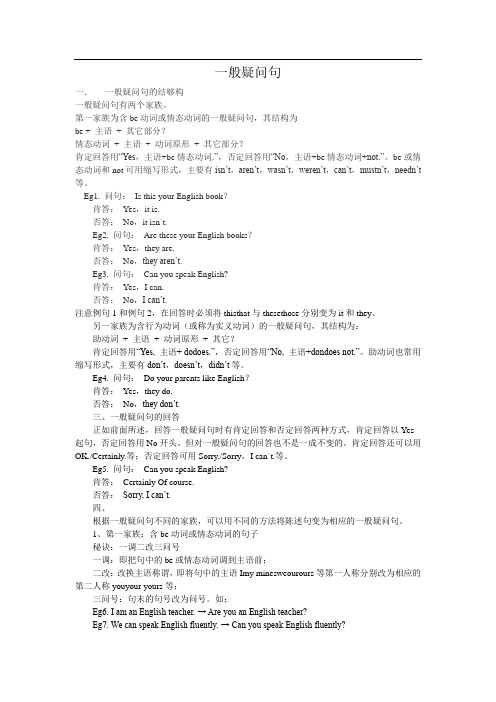
一般疑问句一.一般疑问句的结够构一般疑问句有两个家族。
第一家族为含be动词或情态动词的一般疑问句,其结构为be + 主语+ 其它部分?情态动词+ 主语+ 动词原形+ 其它部分?肯定回答用“Yes,主语+be情态动词.”,否定回答用“No,主语+be情态动词+not.”。
be或情态动词和not可用缩写形式,主要有isn’t,aren’t,wasn’t,weren’t,can’t,mustn’t,needn’t 等。
Eg1. 问句:Is this your English book?肯答:Yes,it is.否答:No,it isn`t.Eg2. 问句:Are these your English books?肯答:Yes,they are.否答:No,they aren’t.Eg3. 问句:Can you speak English?肯答:Yes,I can.否答:No,I can’t.注意例句1和例句2,在回答时必须将thisthat与thesethose分别变为it和they。
另一家族为含行为动词(或称为实义动词)的一般疑问句,其结构为:助动词+ 主语+ 动词原形+ 其它?肯定回答用“Yes, 主语+ dodoes.”,否定回答用“No, 主语+dondoes not.”。
助动词也常用缩写形式,主要有don’t,doesn’t,didn’t等。
Eg4. 问句:Do your parents like English?肯答:Yes,they do.否答:No,they don’t.三、一般疑问句的回答正如前面所述,回答一般疑问句时有肯定回答和否定回答两种方式,肯定回答以Yes 起句,否定回答用No开头。
但对一般疑问句的回答也不是一成不变的。
肯定回答还可以用OK./Certainly.等;否定回答可用Sorry./Sorry,I can`t.等。
Eg5. 问句:Can you speak English?肯答:Certainly Of course.否答:Sorry, I can’t.四、根据一般疑问句不同的家族,可以用不同的方法将陈述句变为相应的一般疑问句。
一般疑问句的肯否回答及否定句
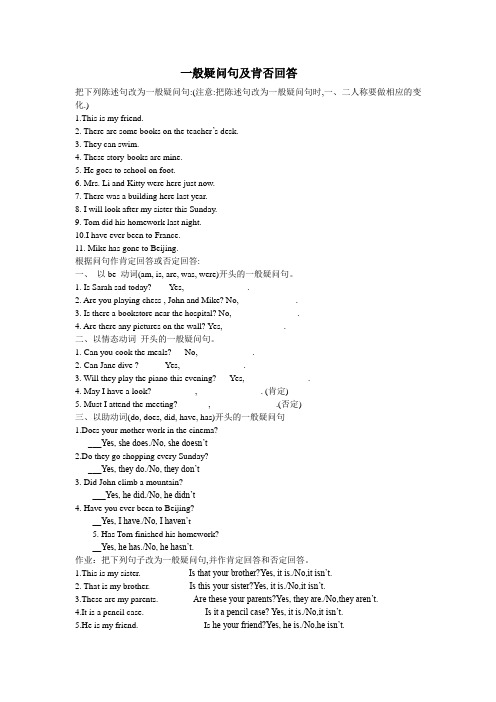
一般疑问句及肯否回答把下列陈述句改为一般疑问句:(注意:把陈述句改为一般疑问句时,一、二人称要做相应的变化.)1.This is my friend.2. There are some books on the teacher’s desk.3. They can swim.4. These story-books are mine.5. He goes to school on foot.6. Mrs. Li and Kitty were here just now.7. There was a building here last year.8. I will look after my sister this Sunday.9. Tom did his homework last night.10.I have ever been to France.11. Mike has gone to Beijing.根据问句作肯定回答或否定回答:一、以be 动词(am, is, are, was, were)开头的一般疑问句。
1. Is Sarah sad today? Yes, ______ ______.2. Are you playing chess , John and Mike? No, _____ _____ .3. Is there a bookstore near the hospital? No, ______ ______ .4. Are there any pictures on the wall? Yes, _______ ______.二、以情态动词开头的一般疑问句。
1. Can you cook the meals? No, _____ _____.2. Can Jane dive ? Yes, ______ ______.3. Will they play the piano this evening? Yes, ______ ______.4. May I have a look? _____, ______ ______. (肯定)5. Must I attend the meeting? _____, _______ _______.(否定)三、以助动词(do, does, did, have, has)开头的一般疑问句1.Does your mother work in the cinema?___Yes, she does./No, she doesn’t2.Do they go shopping every Sunday?___Yes, they do./No, they don’t3. Did John climb a mountain?___Yes, he did./No, he didn’t4. Have you ever been to Beijing?__Yes, I have./No, I haven’t5. Has Tom finished his homework?__Yes, he has./No, he hasn’t.作业:把下列句子改为一般疑问句,并作肯定回答和否定回答。
一般疑问句的回答
要点回顾
1.如何回答一般疑问句,规则 2.简单回顾人称代词 3.实例讲解 4.课堂练习(两人为以小组,实际操练) 5.作业 (课后习题)
一般来说,对于一般疑问句直接用yes或no来回答就 可以
其基本形式是:肯定回答 Yes , 主语+be动词 否定回答 No , 主语+be动词
有时候主语+be动词可 以缩写,比如she is not , 缩写成she isn’t .注意人
称和数的变化
Exercise:
1.——Are those your books ? ——________.
No ,she isn’t. She is from
the US.
What’s this?
Is this a book?
This is a book.
Yes ,it is !
What’s this ?
It is my pen.
Is this your pen.
Yes ,it is !
How to answer a general question?
A.Yes ,they are. B. No , they aren’t. 2.——Is Mr. Gao from Japan?
——________. A. Yes ,he is . B. No ,he isn’t
3.——What is on my hand? ——______. A.It is a pen. B.It is not a pen. ——Is it a pen? ——_______. A.Yes ,it is . B. No ,it isn’t. 4.——Is that Lily? ——________. A.Yes , he is. B.No, he isn’t.
新目标英语一般疑问句及否定句专项练习及答案
新⽬标英语⼀般疑问句及否定句专项练习及答案七年级英语⼀般疑问句及否定句专项练习⼀.将下列句⼦改为⼀般疑问句,并做出肯定及否定回答1.I am a student. _____ _____ a student.?肯:__________________ 否:________________2.She is a girl. ______ ______ a girl?肯:__________________ 否:________________3.His first name is Tom. ______ _______ ______name?肯:__________________ 否:________________4.This is a ruler. ______ ________ a ruler?肯:__________________ 否:__________________5.They are my parents. ______ ______ _______ parents?肯:__________________ 否:__________________6.There is a book on the desk. ______ ______ a book on the desk?肯:__________________ 否:___________________7.There are some dictionaries on the floor. ______ ______ ______ dictionaries on thefloor?肯:__________________ 否:___________________8.He can play the guitar. ______ ______ play the guitar?肯:__________________ 否:____________________9.They can dance. ______ ______ dance?肯:__________________ 否:_____________________10.My friend wants to know about my morning. _______ ______ _______ ______ to knowabout _______ morning?肯:__________________ 否:_____________________11.Tony has a computer. ______ Tony ______ a computer?肯:__________________ 否:_____________________12.Mr. White is very busy. ______ Mr. White a computer?肯:__________________ 否:_____________________13.He teaches us art. ______ ______ _______ us art?肯:__________________ 否:_____________________14.She watches TV in the morning. ______ ______ ______ TV in the morning?肯:__________________ 否:______________________15.I watch TV in the evening. _______ ______ ________ TV in the morning? 肯:__________________ 否:_____________________16.He runs every day. _______ ______ ________ every day?肯:__________________ 否:_____________________17.I want to know his name. ______ ______ ______ to know his name?肯:__________________ 否:_____________________18.They study at home. ______ ______ _______ at home?肯:__________________ 否:_____________________19.She studies English at school. ______ _______ _______ English at school? 肯:__________________ 否:____________________20.I do my homework every day. _____ _____ ______ _____ homework every day?肯:__________________ 否:_____________________21.He does his homework at 7:00 pm. ______ _______ ______ his homework at 7:00 pm?肯:___________________ 否:_______________________22.They have five rooms. ______ ______ _______ five rooms?肯:___________________ 否:_______________________23.She eats chicken for dinner. _______ ______ _______ chicken for dinner? 肯:___________________ 否:_______________________24.My parents like eating bananas.______ ______ parents______ ______bananas?肯:___________________ 否:_______________________25.We do eye exercises every day. _____ _____ _____ eye exercises every day?肯:___________________ 否:________________________26.He has a green T-shirt. _______ ________ _______ a green T-shirt?肯:___________________ 否:_________________________27.My birthday is October 10th. _______ ______ ________ October 10th ?肯:___________________ 否:__________________________28.Her favorite subject is science. ______ ______ _______ _______ science?肯:___________________ 否:_________________________29.We can see some birds. _______ _______ see ______ birds?肯:___________________ 否:_________________________⼆.将下列句⼦改为否定句1.There is a computer on the desk. There _____a computer on the desk.2.There are some pictures on the wall. There ______ _______ pictures on the wall.3.She is seven years old. She ______ _______ seven years old.4.I like pears. I ______ _______ pears.5.She has a soccer ball. She ________ _________ a soccer ball.6.My mother wants to go to a movie. My mother ______ ________ to go to a movie.7.Tom can play the drums. Tom ________ play the drums.8.I can sing and dance. I _______ sing ________ dance.9.She has some erasers. She _______ ________ ________ erasers.10.I think it is interesting. I _______ ________ it is interesting.11.Mary often plays sports after dinner. Mary ________ ________ ________ sports afterdinner.12.There are some tomatoes in the box. There are _______ _________ tomatoes in thebox.13.Tell him the news. _______ _______ him the news.14.She has brothers and sisters. She ________ _______brothers _______ sisters.15.I think she is right. I _______ ________ she _______ right.16.She gets up at 6:00 in the morning. She _______ ________ up at 6:00 in themorning.三.将下列句⼦改成复数形式1.That is a ruler. _______ ________ ________.2.This is an orange. _________ _________ oranges.3.She is my friend. _________ _________ my __________.4.Is that a pen? _________ _________ ________ ?5.I like tomato. I like ________.6.It’s a dictionary. _________ _________ _________.7.He has an English dictionary. ________ ________ English _________.8.She has a watch. ________ _________ _________.9.This is a comedy and that is a documentary. _______ _______ ________ ________ _______ _________ _________.10.There is a knife in the box. There ________ _________ in the box.11.She is a girl student. _______ are ________ ________.12.She’s a woman doctor. _______ _______ __________ _________.13.Who is your art teacher? Who ________ your art _________?14.It’s a bus. They _________ _________.15.He usually goes to bed at 10:00. They usually _______ to bed at 10:0016.Gina doesn’t play golf every day. (改为肯定句)Gina _______ golf every day.17.Do you have tennis rackets? (改为肯定句)_______ ________ tennis rackets?18.Jim doesn’t have a bag. (改为肯定句) Jim _________ a bag.19.Can you sing? (作否定回答)________, I _________.20.Does he like speaking English? (作肯定回答) _________, he __________.21.Can Jane speak Chinese? (作否定回答)_________, ___________ __________.22.Is this boy your brother? (作肯定回答) __________, ___________ __________.23.Are those her books? (作否定回答) ________, __________ ___________.24.Do they like oranges? (单数形式)_______ she ________ oranges?25.That is an English book. (变复数句) ________ _________ English __________.26.These are buses. (单数形式) _________ ________ _________ _________.答案:⼀:1. Are you Yes, I am. No, I’m not. 2. Is she Yes, she is. No, she isn’t. 3. Is his first name Yes, it is. No, it isn’t. 4. Is this Yes,it is. No, it isn’t. 5.Are they your Yes, they are. No, they aren’t. 6. Is there Yes, there is. No, there isn’t. 7. Are there any Yes, there are. No, there aren’t. 8. Can he Yes,he can. No, he can’t. 9. Can they Yes, they can. No, they can’t. 10. Does your friend want your Yes, she/he does. No, she/he doesn’t. 11. Does have Yes, he does. No, he doesn’t. 12. Is Yes, he is. No, he isn’t. 13. Does he teach Yes, he does. No, he doesn’t. 14. Does he watch Yes, he does. No, he doesn’t. 15. Do you watch Yes, I do. No, I don’t. 16. Does he run Yes, he does. No, he doesn’t. 17. Do you want Yes, I do. No, I don’t. 18. Do they study Yes, they do. No, they don’t. 19. Does she studyYes, she does. No, she doesn’t. 20. Do you do your Yes, I do. No, I don’t. 21. Does he do Yes, he does. No, he doesn’t. 22. Do they have Yes, they do. No, they don’t. 23. Does she eat Yes, she does. No, she doesn’t. 24. Do your like eating Yes, they do. No, they don’t. 25. Do you do Yes, we do. No, we don’t. 26. Does he have Yes, he does. No, he doesn’t. 27. Is your birthday Yes, it is. No, it isn’t.28. Is her favorite subject Yes, it is. No, it isn’t. 29. Can you any Yes, I can, No, I can’t.⼆.1.isn’t 2. aren’t any 3. Is not 4. Don’t like 5. Doesn’t have 6. Doesn’t want 7. Can’t 8. Can’t or 9. Doesn’t have any 10. don’t have 11. doesn’t often play 12. not any 13. don’t tell 14. doesn’t have or 15. don’t think 16. doesn’t get三.1. Those are rulers 2. These are 3. They are friends 4. Are those pens 5. Tomatoes 6.They are dictionaries 7. They have dictionaries 8. They have watches 9. These are comedies and those are documentaries 10. are knives 11. They are girl students 12. They are women teachers 13. are teachers 14. are buses 15. go 16. plays 17. I have 18. has 19. Yes can 20. Yes does 21.No she can’t 22. Yes he is 23. No they aren’t 24. Does like 25. Those are books 26. This is a bus。
一般疑问句及其肯否定回答
仅供个人参考 不得用于商业用途 一般疑问句 一、内涵:由be动词,助动词do/does,情态动词can等引导的问句,并可由Yes或No进行回答的问句。 二、结构:Be(Am/Is/Are) Yes,主语人称代词__ Do/Does +主语+其他+?-- Can No,主语人称代词__ 三、题型 (一)、把陈述句改为一般疑问句: Eg.1.This is a pen. Is this a pen? 2.They are my parents. Are they your parents? 3.He is a good student. Is he a good student? 4.She is clever. Is she clever? Sum up:陈述句中有be动词的,改为一般疑问句的解题步骤:
一提(把be动词提到句首并大写其首字母)
二变(I变you,my变your,we变you)
三照抄加问号(剩余部分直接照抄下来)
5.I can play football. Can you play football? 6.Lily can sing English songs. Can Lily sing English songs? Sum up:陈述句中有情态动词can的,改为一般疑问句的解题步骤:
一提(把情态动词can提到句首并大写其首字母)
二变(I变you,my变your,we变you)
三照抄加问号(剩余部分直接照抄下来) 仅供个人参考 不得用于商业用途 7.I have a pen pal. Do you have a pen pal ? 8.He has a soccer ball. Does he have a soccer ball? 9.She likes reading storybooks. Does she like reading storybooks? 10.Mike wants to be a singer. Does Mike want to be a singer? Sum up:陈述句中有实意动词的(没有be/can),改为一般疑问句的解题步骤:
小学英语四种基本句型-肯定句、否定句、一般疑问句与特殊疑问句
what day 星期几 问星期
Hale Waihona Puke How often 多久 问频率三.句子的种类
类别 陈述句
疑问句
用法 肯定 叙述一件事情或
说明说话人的看法 否定
一般 用于提出问题
特殊 用于提出问题
标点
例句
This is a bag.
That's my book. .
I can see a bag over there.
1.肯定句、否定句和一般疑问句的互换 非单三时用 do, 单三时用 does 非单三 肯定句:I like English.
一般疑问句:Do you like English 否定句:I do not like English. 单三 肯定句:He likes English. 一般疑问句:Does he like English 否定句:He does not like English.
二、肯定句、否定句、一般疑问句和特殊疑问句的相互转换 有 am, is, are 的句子
肯定句变否定句:在 am, is, are 后面加上 not,其余按顺序照抄。 肯定句变一般疑问句:把 am, is, are 提前放到句首并大写 Am, Is, Are,其余照抄。 肯定句变特殊疑问句(就划线部分提问):分 3 步骤 第一步:先变一般疑问句 第二步:找合适的特殊疑问词代替划线部分(划线部分不能在特殊疑问句中出现) 第三步:特殊疑问词提前放到句首,并大写,其余按顺序照抄,省略划线部分。
B: _______
A: I want to make a kite.
12、A:_______ one is fatter, the blue one or the red one B: The blue one.
- 1、下载文档前请自行甄别文档内容的完整性,平台不提供额外的编辑、内容补充、找答案等附加服务。
- 2、"仅部分预览"的文档,不可在线预览部分如存在完整性等问题,可反馈申请退款(可完整预览的文档不适用该条件!)。
- 3、如文档侵犯您的权益,请联系客服反馈,我们会尽快为您处理(人工客服工作时间:9:00-18:30)。
一般疑问句肯定及否定回答
一般疑问句 肯定回答
否定回答
以-问 用--答 问句中的主语 答句中的
主语
由
Be
动
词
来
问
,
也
由
Be
动
词
来
回
答
be
:
am
is
ar
e
Am I a teacher?
Yes,you are . No,you aren't. am are I You
Are you a student?
Yes,I am . No,I am not . Are am you I
Are you students?
Yes,we are . No,we aren't. Are are you We
Is he Tom?
Yes,he is . No,he isn't. Is is He He
Is she your friend?
Yes,she is . No,she isn't. Is is She She
Is it a cat?
Yes,it is . No,it isn't. Is is it It
Is Lucy 8 years old ?
Yes,she is. No,she isn't. Is is Lucy She
Is this a pen?
Yes,it is . No,it isn't. Is is this
It
Is that a pencil?
Yes,it is . No,it isn't. Is that
Is there a book on the
desk? Yes,there is .No,there isn't Is is there There
Are these books?
Yes,they are. No,they aren't. Are are these They
Are those pens?
Yes,they are . No,they aren't. Are those
由助
动词
do,
does
Do you have a book?
Yes,I have. No, I haven't. Do do you I
,
did,
will
提
问,
也用
它们
来回
答。
Do they have any books?
Yes,they do. No,they don't. Do do they They
Does he have a pen?
Yes,he does. No,he doesn't. Does does he He
Does he have an eraser?
Yes,she does. No,she doesn't. Does does she She
Does it like to sleep?
Yes,it does. No,it doesn't. Does does it It
Did you lost your way?
Yes,I did. No,I didn't. Did did You I
Did he go to school?
Yes,he did. No,he didn't. Did did he He
Will he go to the zoo?
Yes,he will. No,he Won't. Will will he He
Will they go home?
Yes,they will. No,they Won't. Will will they They
Will you go home?
Yes,I will. No,I Won't.
Will will you I
Did they go swimming?
Yes,they did. No,they didn't. Did did they They
情
态
动
词,
用
can
Can you sing?
Yes,I can. No,I can't.
Can can you I
Can they dance?
Yes,they can. No,they can't. Can can they They
Can he swim? Can can he He
问,
也
用
它
来
答
Yes,he can. No,he
can't.
Can she draw?
Yes,she can. No,she can't. Can can she She
特殊,要 记 住。 Must I go to school?
Yes,you have to. No,you needn't. Must have to/ needn't I You
Would you like something to drink? ---Yes,please. /---
No,thanks/thank you.
Could you tell me something about him?---Yes,sure. /--- No,I am sorry.
总结:一般疑问句由助动词do,does,did或be动词am,is,are或情态动词
can,will,must,would,could…来提问,肯定回答用Yes,否定回答用No,除了
第一二人称之间有变化外,其余,答句中的主语与问句中相同.
